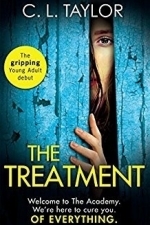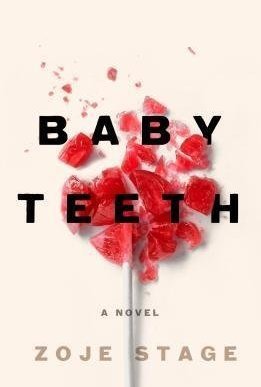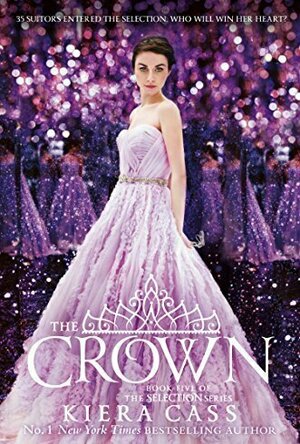
Leading Strategic Change in an Era of Healthcare Transformation: 2016
Book
This book focuses on how to lead transformative and strategic change in the healthcare industry in...

Runkeeper—GPS Running Tracker
Health & Fitness and Sports
App Watch
Everyone. Every run. Join the community that helps people get out the door and stick with running...
Hazel (1853 KP) rated The Treatment in Books
Sep 28, 2017
You have to help me. We’re not being reformed. We’re being brainwashed. When sixteen-year-old Drew Finch receives this note from a strange woman on the street claiming to be her brother’s psychologist, she does not know how to react. But when a speeding car hits the doctor immediately after, Drew begins to think something portentous is afoot. In The Treatment by C. L. Taylor, the Residential Reform Academy in Northumberland is achieving great things, turning antisocial teenagers into model citizens. Mason, Drew’s brother, has been expelled from three different schools and has been sent to the academy as a last resort, however, Drew now suspects that Mason is in trouble.
In a slightly dystopian setting, Drew, a usually quiet girl, easily gets herself admitted to the academy by punching the school bully. With the intention of helping Mason escape, Drew calmly arrives at the Academy, not realising how much danger she is placing herself in. She soon discovers that this would not be a transitory admission and, unless she escapes, she will become like all the other narcotised students.
Trying to remain fastidious whilst avoiding garrulous roommates and staff, Drew desperately tries to concoct an escape plan, however, she may be too late. The more she learns about the Residential Reform Academy, the more she discovers about the evil intentions behind it. How can she break out of the prison-like building and seek help when the government is deeply involved with the whole sordid procedure?
C. L. Taylor devises an exciting scenario that will appeal to fans of Cecelia Ahern’s Flawed and Kazuo Ishiguro’s Never Let Me Go. A thriller that needs a hero in the unlikely form of a teenage girl, The Treatment is a stimulating story about those without a public voice overthrowing the immoral experiments of the dastards in power.
A One Flew Over the Cuckoo’s Nest for teenagers, this book deals with themes of mental health, oppression and the misuse of authority. Told from the perspective of a girl who has been bullied most of her life and coming from a dysfunctional family, there is a lot for the reader to connect with. Although it does not allay the growing fears of governmental conspiracies, The Treatment ends with the positive message that by standing up to those who do you wrong has its rewards, not only for yourself but for those in similar situations too.
The Treatment is a very enjoyable book that pulls the reader into the story, causing them to question how they would handle a similar situation. Would they be as brave as Drew and her new friends, or would they be doomed to a fate of mindless obedience? Compelling from beginning to end, C. L. Taylor’s latest novel is a refreshing break from the over-the-top science fiction dystopian novels, preferring to tackle futuristic ideas that are much closer to home. This is a book that can be fully recommended to the Young Adult community.
Kristy H (1252 KP) rated Baby Teeth in Books
Mar 11, 2019
"Every win for Hanna was a you-lose for Mommy."
I'd been putting off reading this book for a bit because I'd heard that it was creepy and disturbing, and I can confirm that yes, it is both of those things. Ha. I can't say I'm particularly glad that I read it, though it's an interesting read and certainly different. It mostly held my interest, but after all the hype, I found myself a little letdown: there really wasn't all that much to the story. I found myself waiting that twist, that something special that never came.
Still, Stage does an excellent job of capturing Hanna's child-like voice and telling a story from her unique perspective. The tale alternates between chapters from Hanna's perspective and then Suzette's, and I can't deny that you'll find yourself a little freaked out after reading Hanna's. The book is eerie and disturbing; it's hard to believe, yet not, as it's certainly effectively told. There are some tough moments to read and it's definitely not always for the faint of heart.
I had a tough time empathizing with our adult characters--our cast is mainly limited to the family unit, and I didn't care much for either Alex or Suzette. We are probably supposed to feel bad for Suzette, as she's struggling with both Hanna and failing health (having had Crohn's disease since childhood). And I did, at times, but she talked so much, and kept rehashing things, and I just wanted to shake her to wake up, get a grip, and deal with everything. So yeah. And her husband was just clueless and ugh.
Hanna was a much tougher one--as a parent, I found this one hard. Of course, you want to believe and care for a small child. Yet, you can also empathize with a mom who feels like they need a break from their child. I enjoyed how the book made you think about these kind of things as Hanna started to escalate. What would you do in this situation? How did things get to this point? That's where it is interesting. Some of the best parts are the oozing tension and unease that pervade the whole novel.
Unfortunately, it doesn't completely capitalize on that uneasiness, leaving you a little deflated by the end. I was actually hoping for a little more creepiness, a little less character-study. I definitely enjoyed pieces of this one, and I'd still recommend it due to how different it is.
I received a copy of this novel from the publisher and Netgalley in return for an unbiased review (thank you!).
Hazel (1853 KP) rated The Treatment in Books
Dec 7, 2018
You have to help me. We’re not being reformed. We’re being brainwashed. </i>When sixteen-year-old Drew Finch receives this note from a strange woman on the street claiming to be her brother’s psychologist, she does not know how to react. But when a speeding car hits the doctor immediately after, Drew begins to think something portentous is afoot. In <i>The Treatment</i> by C. L. Taylor, the Residential Reform Academy in Northumberland is achieving great things, turning antisocial teenagers into model citizens. Mason, Drew’s brother, has been expelled from three different schools and has been sent to the academy as a last resort, however, Drew now suspects that Mason is in trouble.
In a slightly dystopian setting, Drew, a usually quiet girl, easily gets herself admitted to the academy by punching the school bully. With the intention of helping Mason escape, Drew calmly arrives at the Academy, not realising how much danger she is placing herself in. She soon discovers that this would not be a transitory admission and, unless she escapes, she will become like all the other narcotised students.
Trying to remain fastidious whilst avoiding garrulous roommates and staff, Drew desperately tries to concoct an escape plan, however, she may be too late. The more she learns about the Residential Reform Academy, the more she discovers about the evil intentions behind it. How can she break out of the prison-like building and seek help when the government is deeply involved with the whole sordid procedure?
C. L. Taylor devises an exciting scenario that will appeal to fans of Cecelia Ahern’s <i>Flawed</i> and Kazuo Ishiguro’s <i>Never Let Me Go</i>. A thriller that needs a hero in the unlikely form of a teenage girl, <i>The Treatment</i> is a stimulating story about those without a public voice overthrowing the immoral experiments of the dastards in power.
A <i>One Flew Over the Cuckoo’s Nest</i> for teenagers, this book deals with themes of mental health, oppression and the misuse of authority. Told from the perspective of a girl who has been bullied most of her life and coming from a dysfunctional family, there is a lot for the reader to connect with. Although it does not allay the growing fears of governmental conspiracies, The Treatment ends with the positive message that by standing up to those who do you wrong has its rewards, not only for yourself but for those in similar situations too.
<i>The Treatment</i> is a very enjoyable book that pulls the reader into the story, causing them to question how they would handle a similar situation. Would they be as brave as Drew and her new friends, or would they be doomed to a fate of mindless obedience? Compelling from beginning to end, C. L. Taylor’s latest novel is a refreshing break from the over-the-top science fiction dystopian novels, preferring to tackle futuristic ideas that are much closer to home. This is a book that can be fully recommended to the Young Adult community.
Hazel (1853 KP) rated The Crown (The Selection, #5) in Books
Dec 17, 2018
<i>This ebook was provided by the publisher via NetGalley in exchange for an honest review </i>
So here it is, the latest (final?) book of <i>The Selection</i> series by popular young adult author Kiera Cass. <i>The Crown</i> continues from the exact place that the previous book, <i>The Heir</i>, left off, with Queen America having suffered a heart attack, and Eadlyn’s twin brother running off to France after secretly marrying. Regardless of the personal troubles, the royal family must keep on running the country of Illéa, however this means that great responsibilities are now resting on teenage Eadlyn’s shoulders.
Readers will already know that the wife, or in this instance husband, of the heir of the throne is chosen through a selection process. Thirty-five suitors were randomly selected from thousands of applicants to try and win the princess’ heart. The boys have been narrowed down to six, but Eadlyn has more pressing issues to worry about. Naturally she is concerned about her mother’s health and sad about being separated from her twin, but the biggest thing on her mind is being named regent whilst her father stays by his wife’s bedside. Eadlyn must temporarily rule like a queen, which is easier said than done.
There is less focus on the selection process in <i>The Crown</i> than there was in the first three novels – where America was eventually selected to become Prince Maxon’s bride. Primarily this is because Eadlyn’s heart is not in it. She does not love any of the elite – the top contestants – and it is only for public appearances that she continues with the game. What Kiera Cass emphasizes in this novel is that being a princess is not all parties and money and power. Instead it is hard work, physically and emotionally exhausting, and almost impossible to be your own person. Initially Eadlyn was viewed as a cold-hearted, spoilt child, but her new responsibilities open her eyes to the ways of the world, revealing her better nature to the people of Illéa.
Unfortunately it needs to be said that <i>The Crown</i> does not quite live up to the rest of the books in the series. The idea of a selection process feels old and over done, and Eadlyn’s personality does not quite work for a romance novel. The conclusion of the book appeared to happen a bit too suddenly, and also rather conveniently. What should have resulted in protest or at least disappointment for a few of the characters became something that was easily accepted instead. Not entirely realistic.
On the other hand, the ending is what most readers will have wished for, myself included, so must not complain too much. It is great to be reunited with the lovely characters, particularly the thoughtful and kind selected suitors, and Eadlyn’s sweet younger brothers. They are the types of people you would feel blessed to know in real life. All in all, <i>The Crown</i> is likely to put a smile on your face.

Slimming World Magazine
Health & Fitness and Magazines & Newspapers
App
Slimming World is the UK’s best-selling slimming title. We’re dedicated to making your slimming...

A Woman's Decision: Breast Care, Treatment & Reconstruction
Karen Berger, John Bostwick and Glyn E. Jones
Book
Answers to your patients' most vital, heartfelt questions! For years, A Woman's Decision has been...

Sleep Sounds HQ: relaxing aid
Health & Fitness and Lifestyle
App
* As seen on CNN, Lifehacker, and Engadget.com * Fall asleep fast to over 600 high-quality...



